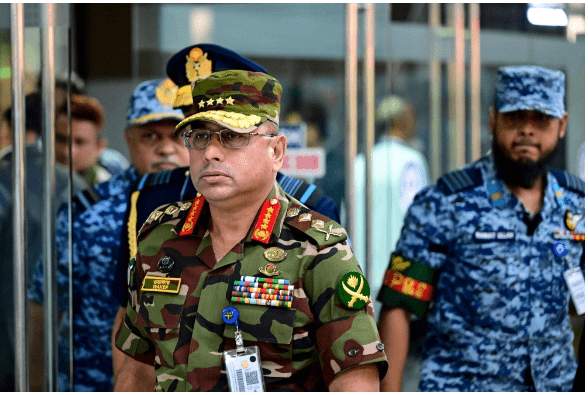
The recent violent upheaval that led to a military-backed regime change in Bangladesh, followed by the country’s pleas for $6.5 billion in international bailouts, raise concerns about the future direction of the world’s eighth most-populous country.
The toppling of Prime Minister Sheikh Hasina’s government has also triggered an ominous resurgence of radical Islamism, including systematic attacks on religious minorities.
As recently as 2022, Bangladesh was seen internationally as headed toward rapid economic development. But today, nothing better illustrates the unraveling of Bangladesh’s economic success story than its urgent requests for a new $3 billion International Monetary Fund bailout, as well as $1.5 billion from the World Bank and $1 billion each from the Asian Development Bank and the Japan International Cooperation Agency.
Hasina, while becoming increasingly undemocratic during her over 15-year reign, gave Bangladesh political stability and impressive economic growth, before the global economic fallout from the Ukraine war began weighing on Bangladeshi finances. In fact, the country’s stability and remarkable-growth trajectory stood in stark contrast to the chronic political and economic turmoil in Pakistan, from which Bangladesh seceded in 1971 following a bloody war of liberation that left up to 3 million civilians dead in a genocide perpetrated by the Pakistani army and other pro-Pakistan forces.
Today, the military-picked interim civilian-led regime is struggling to restore the rule of law and revive an economy pummeled by large-scale mob violence and destruction that both preceded and followed Hasina’s overthrow in a youth-led uprising, with her loss of support from the powerful military proving decisive. The military has traditionally been a key player in Bangladeshi politics.
Several hundred people were killed in the violence, many in police firings but also in shootings by Islamists and other rioters, some of whom, according to the new regime, looted rifles from law-enforcement officers and others. Mobs also captured some policemen, beating them to death. At least 44 policemen were killed by mobs, with bodies of some hung from bridges in Dhaka, the nation’s capital.
With the overthrow of the 76-year-old “Iron Lady,” the Islamists have returned with a vengeance, resulting in widespread attacks on the country’s long-persecuted and dwindling Hindu minority.
To make matters worse, political vendettas have gained momentum, as the new regime has engaged in or condoned human rights abuses, including purges, arbitrary arrests, physical assaults on political detainees in courts and curtailment of the rights to liberty and freedom of expression. Academics, journalists, former justices, local officials, lawyers, political opponents and other dissidents have also been jailed on trumped-up murder charges.
In a case last weekend, an ailing, 75-year-old retired Supreme Court justice, after being arrested in a dehumanizing manner, was so badly beaten up in a magistrate’s court, including repeatedly kicked in the groin, that he needed emergency surgery.
All this raises the question whether Bangladesh could go the way of Pakistan, whose broken economy and dysfunctional politics have engendered unending violence, including Islamist extremism and cross-border terrorism. Elections in Pakistan have failed to weaken the vise-like grip of its military on national politics.
Like in Pakistan, the military in Bangladesh has now returned as the final arbiter in national politics, with the army chief becoming the power behind the throne. As if to let the cat out of the bag, M. Sakhawat Hussain, a retired military general holding a minister-level position in the interim regime, warned those pursuing political extortion that he had “requested the army chief to break your legs.” The interim administration, led by an 84-year-old Nobel Peace Prize winner, Muhammad Yunus, lacks constitutional legitimacy.
The Bangladeshi military holds substantial commercial assets in multiple economic sectors, like Pakistan’s armed forces.
Just as Pakistan continues to teeter on the brink of default, the Bangladesh economy is in dire straits, with foreign reserves dwindling rapidly, inflation spiraling, the banking sector in turmoil and economic activity largely at a standstill. It will not be easy to restore the confidence of foreign investors after the large-scale looting, vandalism and arson since July. Many countries’ advisories against travel to Bangladesh remain in effect.
Today, the Islamist resurgence poses a serious law-and-order challenge in Bangladesh, as it has long done in Pakistan. In fact, just as Pakistan’s military maintains cozy alliances with militant groups, the Bangladesh military has had a nexus with radical Islamists.
Hasina’s secular government had cracked down on such violent religious groups. But amid the protests, mobs broke into prisons and freed hundreds of radical Islamists and terrorists, including those wanted in India for terror activity. The attacks on prisons began more than two weeks before the government’s toppling, but gathered pace in the aftermath of Hasina’s forced departure to India. The Hizb ut-Tahrir extremist group, which was proscribed by Hasina and some Western governments, is now operating freely in Bangladesh, holding big rallies.
It was Bangladesh’s chief of the army, Gen. Waker-uz-Zaman, who told the nation in a televised address on Aug. 5 that Hasina had quit and left the country, saying he was “taking full responsibility” and would help to “form an interim government.”
But, instead of a broad-based government of national unity, a partisan administration is now in office that includes two student protest leaders, a hard-line Islamist preacher and three retired military generals. This has contributed to continuing purges, as well as revenge attacks and killings.
Bangladesh is a highly polarized country with a poisonous political culture that, over the decades, has fostered a cycle of frenzied violence and deadly retributions. The recent brutal violence is the latest example.
Without sincere efforts to initiate national reconciliation and healing, the deep splits in Bangladesh will likely stoke greater hate, vengeance and economic disruption, with the risk that the nation could become a mirror image of its old nemesis, Pakistan.






